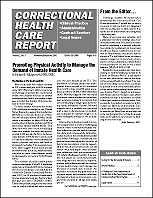Treatment of the Offender
Author: R. David Parrish, Psy.D..
Source: Volume 04, Number 02, January/February 2003 , pp.20-21(2)

< previous article |next article > |return to table of contents
Abstract:
Given the public perception of corrections (often based on media stories), one would think that someone like myself, who has worked in an ultra-maximum prison for 20 of his 28 years as a teacher, psychologist, and administrator in corrections, who has seen bloodshed and been taken hostage, would have a pessimistic view of the potential for offenders to change. In fact, my experience is that as a society we are unaware of the true nature of offensive behavior and the process necessary to effect behavioral change. One place to begin is to examine our conceptualization of offensive behavior. This is useful not just for correcting the unlawful and dangerous actions of “criminals,” but for understanding all offensive behavior. We generally think of an offender as a person who has committed a crime and who is in prison. Perhaps our concept of what we mean by “offenses” and who we mean by “offender” limits our understanding and our ability to provide effective treatment.Keywords: anti-social behavior, internal processing, non-judgmental interaction
Affiliations:
1: Riverfront State Prison.